You may remember Trevor Potter as the powerhouse Washington lawyer who made Stephen Colbert famous by helping the ambitious satirist create a political action committee which enabled him to strike fear (but little loathing) into the hearts of every other candidate and (almost) throw the 2012 presidential race into the House of Mirth where the ticket of Colbert and Potter would have won on the sheer basis of the applause meter.
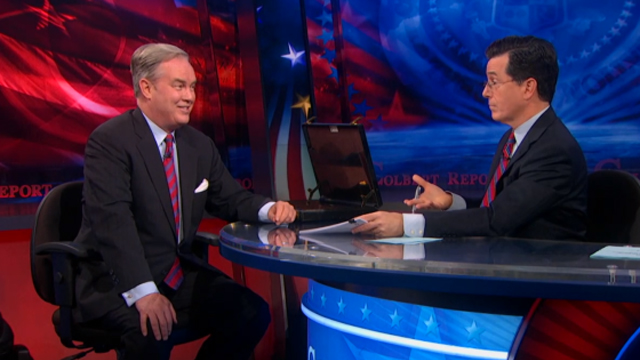
Trevor Potter appearing on “The Colbert Report” in 2011 to explain how PACs work to Stephen before they start their own public action committee.
After the election, Mr. Colbert fell into obscurity as the host of The Late Show while Potter continues his work crusading to save democracy from plutocracy. The noted attorney, who also counseled Senator John McCain during his 2000 and 2008 presidential campaigns, currently heads up the Campaign Legal Center which tracks and pursues cases related to campaign finance, political communication and ethics at all levels of government.
He delivered the following speech last week at the Independent Sector National Conference in Miami, Florida. We are sharing it here with you to dispel the perception that this issue, like many today, is a partisan issue. It’s not. And the good news is there is a solution. Hear what Trevor Potter has to say. — Bill Moyers
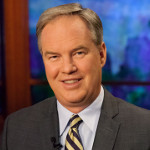
On what issue can 80 percent of Republicans and 83 percent of Democrats find common ground? Believe it or not, the answer is money in politics!
Overwhelmingly, Americans do not like where we are. These huge supermajorities of Republicans and Democrats polled agreed with the following statement:
This is, of course, a reference to the 2010 Supreme Court case of Citizens United. Here is another number: 87 percent. Once again, an across-the-board consensus among the American people. Nearly 9 out of 10 — over 80 percent of both major parties — agreed that:
Think about that a moment: 87 percent of Americans think that our campaign finance system should be the exact opposite of what it currently is!
Finally, there is this number: 59 percent of Americans agree with the following statement:
“Start over!” Whatever that means — and some of the possibilities are pretty scary — it is a dramatic cry of disillusionment from a majority of Americans.
What’s the reason behind all of this disillusionment? Concerns over money’s influence in politics aren’t new, but this level of political revolt among the American public should set off alarm bells. What has changed in our campaigns, elections and politics to bring this about?
To start answering that question, let’s look at the cost of presidential elections. This chart shows the amount of money spent by presidential campaigns between 1976 — the first election under the post-Watergate campaign finance regime — and 2008, the last election in which a major party candidate used the presidential public financing system. One important thing to note about this chart: its amounts are in constant, inflation-adjusted, 2008 dollars. This means we have had a 958 percent increase in the amount spent on presidential campaigns in just 32 years.
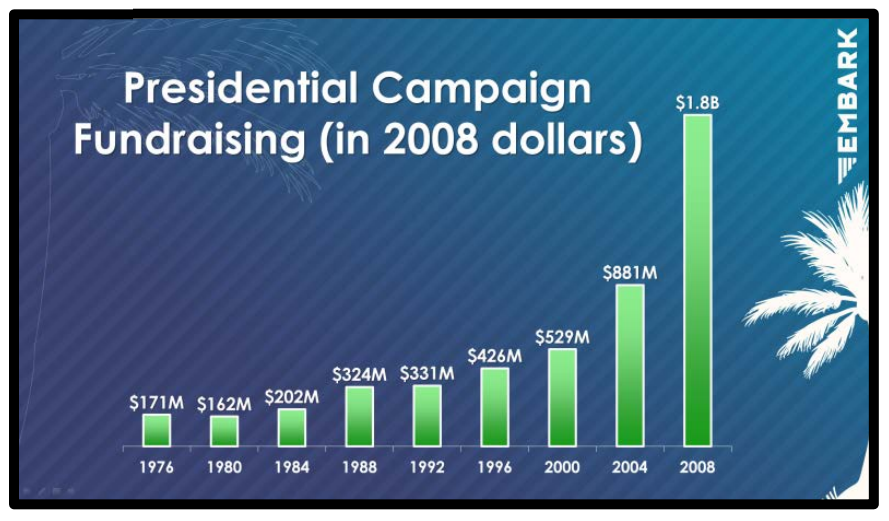
Where is all this money coming from? While 87 percent of Americans are calling for an end to money’s dominant role in politics, a tiny fraction of our population might disagree. Because in the 2014 election cycle, only one quarter of one percent of the American population donated $200 or more to any federal campaign, party or PAC. Ninety-nine and three-quarters percent of all Americans are not even “in the system.”
Finally, according to The New York Times earlier this month, just 158 families and the companies they control accounted for more than half of all the money donated so far in the 2016 presidential race. The Times observed that “[n]ot since before Watergate have so few people and businesses provided so much early money in a campaign.”
What has changed in our elections to produce this situation where a minuscule number of hyper-wealthy Americans play such a dominant role in our elections? First, voluntary public financing was used by every major presidential nominee from 1976 to 2004, and while it wasn’t perfect, it was effective.
Let’s look at two numbers that tell that story: 3 and 223. During his 1984 re-election campaign, Ronald Reagan attended a grand total of three fundraising events — and even then, they were for the Republican National Committee, not his campaign. In fact, he never attended a single fundraiser for his own reelection campaign. Why would he? It was publicly funded; he didn’t need to.
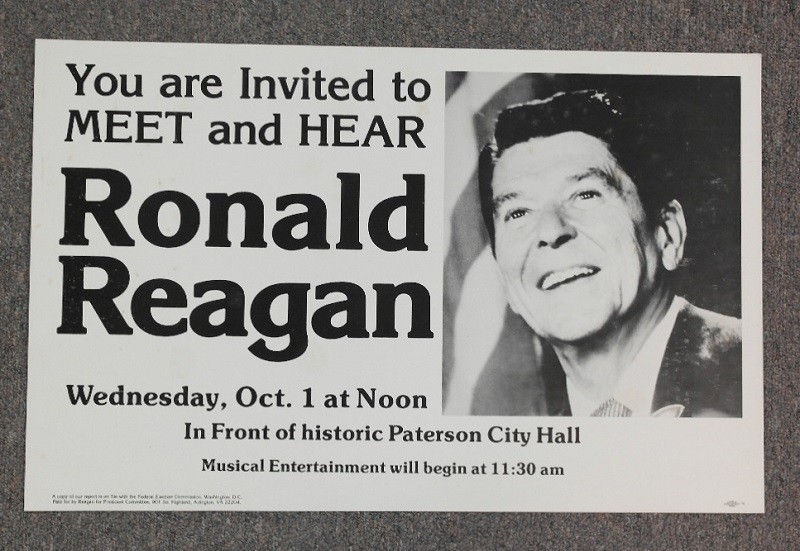
Original cardboard poster. “You Are Invited To Meet and Hear Ronald Reagan” Promotes campaign rally at Paterson City Hall with young photo of Reagan. Paid for by Reagan for President Committee, Arlington, Virginia. (Courtesy of Lori Ferber Presidential Memorabilia)
In 2012, by contrast, after deciding not to participate in the presidential public finding system four years earlier because he could raise more money outside of it, President Barack Obama attended 223 fundraising events leading up to his re-election. It’s reasonable to wonder how one could even find the time to be president when having to attend so many fundraising events. But it turns out the president doesn’t even have the worst of it.
Here is another figure: 40 percent. This figure comes from a leaked PowerPoint slide showing a recommended daily schedule for new members of Congress, which was part of a presentation given to freshman representatives in January 2013 by the Democratic Congressional Campaign Committee.
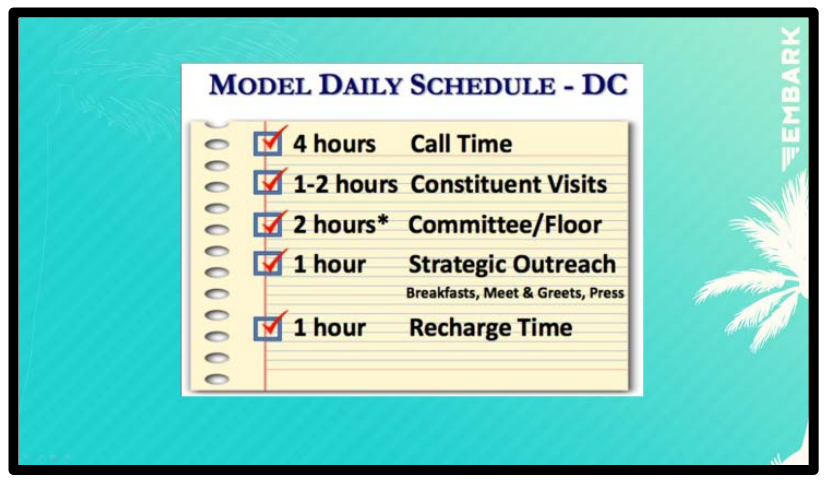
Though it includes a few of the things we would expect from our elected officials — talking with constituents and attending committee meetings — the single largest item taking up at least twice as much time as any of those other activities is “call time.”
“Call time” is the hours a day members of Congress spend not in their offices or at work, but down the street in the basement of a party office dialing for dollars. We’ve now reached the point where money has become so singularly important in winning elections that the “model schedule” for an elected representative makes fundraising for four hours a day their biggest priority.
How did this happen? The presidential public funding system did not collapse in a vacuum — part of the reason that candidates stopped participating is that the amount of money available to support candidates outside of that system has grown exponentially because of judicial and regulatory changes.
Federal contribution limits have increased, but no modifications were made to the public funding system since 1976. President Obama promised when he announced he would not take public funds in 2008 that he would make reform and modernization of the presidential funding system a priority if elected — but nothing at all has happened.
The courts and administrative agencies have acted — or failed to act — in ways that have allowed unlimited corporate and labor expenditures in federal elections, created super PACs that can take unlimited contributions even if they are closely tied to candidates, and allowed secret contributions to 501(c)(4)s and other groups spending money in campaigns without disclosing their donors.
These developments are often referred to as “The Citizens United World,” but that’s really a catch-all phrase for an interconnected series of events. In Citizens United, the Supreme Court reversed years of precedent and ruled that corporations had a constitutional right to use shareholders’ money to elect and defeat candidates for public office.
In doing so, it held that unlimited corporate spending would not be “corrupt” or create “the appearance of corruption” because such spending will be totally independent of candidates and their campaign committees. Justice Kennedy wrote:
Because the sources of such spending will be fully disclosed:
Because shareholders will know how corporations are spending their money, and can object:
In fact, none of these three conditions the Court articulated in Citizens United are being met today, due in large part to the failure of regulators to carry out the law and these aspects of the Supreme Court’s decision.
Even though the Court’s decision is predicated on the groups spending this unlimited money being “wholly independent” of candidates and parties, this requirement has become all but meaningless. Super PACs are more and more frequently being created to support a single candidate — sometimes by the candidate himself. The people running a candidate’s super PAC are usually former members of that candidate’s staff, well-acquainted with the campaign’s message and needs.
This year, we’re seeing super PACs taking on roles traditionally filled by the campaign itself – like organizing rallies, handing out bumper stickers, and distributing yard signs. In fact, it is sometimes almost impossible to tell the difference between the campaign and the super PAC — just go to a CARLY for America rally featuring Carly for President, and try to figure out which is which!
On disclosure, the Court was similarly clear — disclosure is absolutely necessary in order to “hold corporations and elected officials accountable.” But again, Justice Kennedy’s vision of “The Citizens United World” was very different than what came to pass.
In the 2004 election cycle — which was, at the time, the most expensive in history — just $32 million in spending was reported by section 501 groups that do not publicly disclose their donors. By 2012 — just eight years later — that number was 10 times larger. In particular, 501(c)(4) organizations’ campaign spending went from a negligible $3 million in 2004, to more than a quarter billion in 2012. Part of the reason for this stunning growth is a regulatory failure by the IRS, which appears determined to avoid dealing with the politically difficult issue of what is a legitimate (c)(4).
Efforts to inform shareholders have fared little better. Since 2011, the Securities and Exchange Commission has had a pending rulemaking petition to create a “shareholder disclosure” rule that would require corporations to tell their shareholders what they spend on political campaigns. The SEC has shown no signs of acting on this petition, despite the fact that the Supreme Court thought shareholders already had this information.
Though the IRS and SEC are failing here, most of the blame for the current ongoing regulatory failure falls on the Federal Election Commission. The FEC has six commissioners, “no more than 3 of any one party,” and any action by the commission requires a vote of at least 4 commissioners. Thus, three commissioners of one party, acting together, are able to block the FEC from doing anything, and that is what has happened over the past several years.
3-3 tie votes at the commission are at an all-time high, with almost every rulemaking, advisory opinion and decisions of whether to even investigate potential violations of law deadlocked 3-3. How bad has this problem become? This is what current FEC Chair Ann Ravel told The New York Times in May of this year:
So, what do we do now? We need to seriously rethink how our campaigns and elections are financed and regulated. Despite the political gridlock surrounding the subject in Washington, passing laws to strengthen transparency, reduce corruptio, and empower average Americans to counter the outsized influence of a wealthy few can be done.
Programs like these, on a national scale — combined with real enforcement of the requirement that outside expenditures be truly independent, and full disclosure of the sources of political funding — would go a long way to giving average citizens back a role in our national elections.
Let me end with the words of a wise civic leader:
That was John Gardner, the founder of Independent Sector, over 40 years ago. The answer to that question — will we have the courage and wisdom to take the necessary steps — must be “yes” today. How else are we to respond to the 87 percent of Americans who believe that “campaign finance should be reformed so that a rich person does not have more influence than a person without money”?
Our republic — our democracy — calls on us to take those steps.

